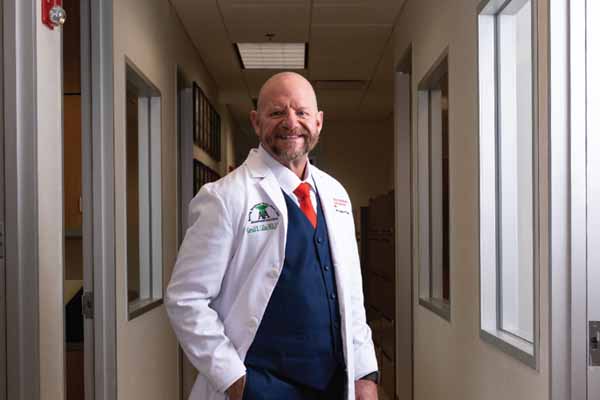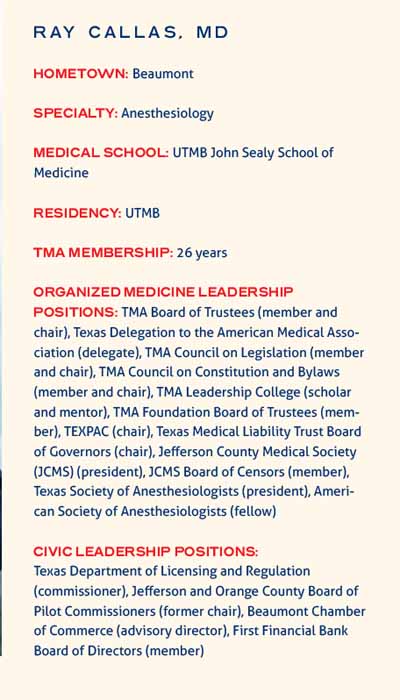
Beaumont anesthesiologist Ray Callas, MD, didn’t expect to become a physician, let alone be elected president of what he unabashedly describes as “the best medical association in the world.”
“I never thought I would be that guy,” he told Texas Medicine.
But after a few detours – including a stint playing college baseball and then wartime military service – Dr. Callas went on to launch a successful career as a physician and advocate. He will be installed as the Texas Medical Association’s 159th president at TexMed May 2-4 in Dallas.
“It’s an honor and a privilege to take care of patients and help lead physicians in the state of Texas,” he said.
Fellow Beaumont physician and past TMA president Mark Kubala, MD, is a mentor, colleague, and close friend of Dr. Callas. They met in the early 2000s when Dr. Callas began practicing in their hometown, including on Dr. Kubala’s surgical cases.
“[Dr. Callas] was, when I first met him, what I call a straight shooter,” Dr. Kubala said. “That’s one of the things about leadership: You have to distinguish and always come up with the truth, even though sometimes it’s not the most politically savvy situation. You have to be honest anyway. ... Ray has that quality.”
Over their years of friendship, Dr. Kubala encouraged Dr. Callas to get involved in the Jefferson County Medical Society (JCMS) and TMA, where he quickly rose through the ranks driven by mentorship and his own high-octane personality. (See “Ray Callas, MD,” page 25.)
He even broke new ground during his 26 years as a TMA member as the first alumnus of TMA’s Leadership College to chair the association’s Board of Trustees and to serve as its president. (See “Lifelong Leadership,” page 30.)
His experience at TMA has prepared him to lead the association at a time when Texas physicians face the challenges of rapid industry consolidation, declining payments, and mounting administrative hassles – and when the state faces a record influx of new physicians and a physician workforce shortage amid an exploding population.
Both are opportunities that put organized medicine in a unique position to offer feasible solutions, Dr. Callas says.
“Physicians know Texas is a great place to practice medicine: Texas is one of few states with medical liability reform, corporate practice of medicine safeguards, and scope-of-practice protections,” among other benefits, he said. “What physicians may not know – especially new physicians coming to Texas – is the role TMA played in securing all those protections.”
Having witnessed and participated in these and more of TMA’s hard-fought wins that make for a healthy practice environment in Texas, Dr. Callas’ top priorities as president center on preventing scope-of-practice creep, defending physician autonomy, and bolstering TMA’s membership.
“Membership is the driving force of how strong our organization is going to be, and how strong medicine’s voice is going to be around the state,” he said.
Although Dr. Callas was drawn to medicine from a young age, his early career path was nonlinear, including a failed first attempt at college.
He credits his parents with providing inspiration and instilling in him inclusive values. His father, Gerald Callas, MD, a longtime anatomy professor at The University of Texas Medical Branch (UTMB) School of Medicine in Galveston, and his mother, Carolyn, co-owned and operated the Carolyn Ehman Dancing Academy for more than 50 years.
“It was always cool to watch my dad carry a black bag back in the day and do house calls,” he said. “The respect that he generated as a physician, that was awesome.”
When Dr. Callas’ first foray into higher education didn’t pan out, he enlisted in the U.S. Navy, where he served a submariner in Operation Desert Storm during the Gulf War. The experience was formative and continues to influence him today.
“It gives you perspective that life is very, very fragile,” he said.
Despite his pride in having served his country, Dr. Callas also learned that a military career was not for him. After being honorably discharged in 1992, he returned to his studies with newfound resolve, completing his undergraduate studies at Texas A&M University in 1995 and earning his medical degree from UTMB in 2000.
“It was improbable but not impossible,” he said of this turnaround, adding that receiving his medical school acceptance letter was one of the most emotional moments of his life.
Dr. Callas stayed at UTMB for his residency in anesthesiology, which drew him in with the promise of shift work and a balance between downtime and high-intensity situations. This suits his personality, which also is high intensity, with moments of groundedness. Each morning, on his drive to work, he says he prays “for the blessing and decision-making to make sure [his] patients are safe.”
During his residency and initial years in practice, Dr. Callas sought out mentorship and other leadership development opportunities, which in turn cemented his passion for organized medicine.
In addition to Dr. Kubala, he credits Galveston anesthesiologist Lynn Knox, MD, and Brenham anesthesiologist James Arens, MD, with pushing him to get involved with JCMS, TMA, and the Texas Society of Anesthesiologists.
“I was blessed to have mentors who listened to me and gave me pearls,” he said, citing a gift from Dr. Kubala: The Standard Code of Parliamentary Procedure.
This push came at a pivotal moment, when TMA was spearheading medical liability reform and advocating for other legislation that would go on to rank among its most significant victories.
“Back in 2002, 2003, whenever I was a brand-new physician, still in residency, getting ready to come out the chute into private practice, I remember getting involved in tort reform,” he said. “That’s really when I cut my teeth” and learned what it meant to be a physician advocate.
Soon after, he enrolled in leadership training, including the inaugural 2010 class of TMA’s Leadership College, a free, nine-month program that prepares scholars to take on leadership roles in organized medicine, their practices, and their communities.
Dr. Callas certainly fulfilled this mandate. In addition to his many roles within organized medicine, he is a leader within his practice, where he is board president, and in his community, serving as advisory director of the Beaumont Chamber of Commerce and board member of the First Financial Bank.
Hooked on advocacy, he continued to grow in this role as TMA successfully urged Congress in 2015 to repeal the flawed sustainable growth rate formula used by Medicare to calculate physician payments, and the Texas Legislature in 2019 to enact surprise-billing protections.
His faith and his family – his wife of more than 20 years and registered nurse, Lisa; and his daughters, Emerie, MacKenna, and Raygan – help him balance such a full schedule.
“Being involved makes me feel young,” he said.

Once installed as TMA president, Dr. Callas hopes to build on the association’s strengths as envisioned in TMA’s five-year strategic plan, which he helped develop as 2023 chair of TMA’s Board of Trustees.
In carrying out that plan, one of Dr. Callas’ top goals is maintaining TMA’s track record of stymying scope-of-practice infringements on the practice of medicine in the Texas Legislature, with more than 130 scope-creep bills stopped in the 2023 session alone.
He attributes this success to the inroads TMA has built with state leadership over decades.
“We’ve created such a plethora of leaders in Texas medicine that our voice is very strong.”
With another legislative session set to kick off in January 2025, Dr. Callas plans to lean on these relationships in the year ahead – and urges physicians to do so locally with their lawmakers – to preserve patients’ access to high-quality care no matter where they live and to dissuade future scope-creep legislation.
This goal becomes especially important as – evidenced by the 2023 legislative session – nonphysician practitioners continue to bolster their arguments that scope expansions are necessary given Texas’ physician workforce shortage.
Nonphysician practitioners play a pivotal role on any health care team, and “I want to make sure we’re all together,” he said. But rather than relegating patients to a lower standard of care, that health care team “has to be physician-led.”
Dr. Callas is similarly vigilant when it comes to encroachments on physician autonomy by payers, hospitals, venture capitalists, and other nonmedical third parties.
“[They] aren’t going to overrun us,” he said.
That goes for whatever practice setting or business model physicians may find themselves in – and Dr. Callas wants to ensure physicians have options.
His tenure hits at a time when 34% of Texas physicians are in independent settings and 66% are employed, whether by hospitals, health systems, or other corporate entities, according to the Physicians Advocacy Institute.
“I want to be the voice and the leader of all physicians, from [independent] practice to private equity to hospital-employed to academics,” Dr. Callas said. “Whatever you want to do as a physician, I’m 100% on board.”
With independent practice becoming an increasingly rare choice – whether because of successive Medicare physician pay cuts or other factors outside of physicians’ control – Dr. Callas, a staunch supporter of Medicare payment reform and other policy changes that independent practices say are long overdue, understands his colleagues’ plight:
“I’m that small shop,” said Dr. Callas, whose physician-owned Anesthesia Associates is among the oldest independent medical groups in Texas.
Wherever physicians find themselves on the membership spectrum – as medical students, residents, young physicians starting out, or those further along in their careers – Dr. Callas wants them to feel represented and supported by TMA and the value it has to offer.
Having benefited himself, he hopes to pay it forward by being available to and mentoring as many of his physician colleagues as he can, particularly as TMA embarks this year on its inaugural listening tour around the state. (See “Cultivating Healthy Communities,” page 5.)
“I’m your all-access type of president. I want to create more and more leaders.”